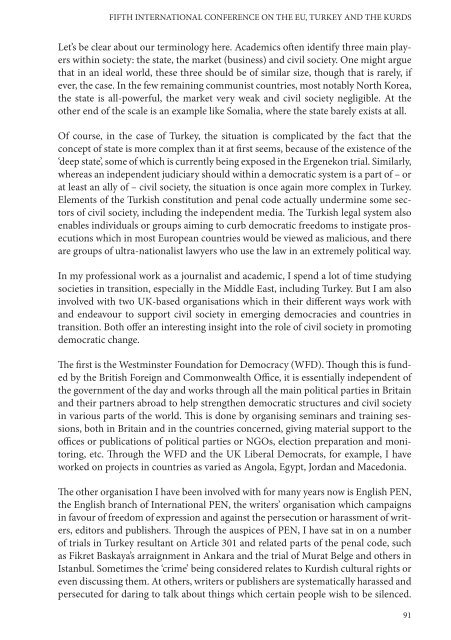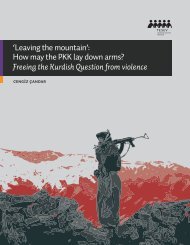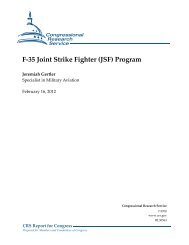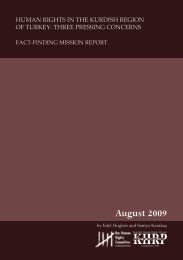FIFTH INTERNATIONAL CONFERENCE ON THE EU TURKEY AND THE KURDS
fifth international conference on the eu, turkey and the kurds
fifth international conference on the eu, turkey and the kurds
You also want an ePaper? Increase the reach of your titles
YUMPU automatically turns print PDFs into web optimized ePapers that Google loves.
<strong>FIFTH</strong> <strong>INTERNATI<strong>ON</strong>AL</strong> <strong>C<strong>ON</strong>FERENCE</strong> <strong>ON</strong> <strong>THE</strong> <strong>EU</strong>, <strong>TURKEY</strong> <strong>AND</strong> <strong>THE</strong> <strong>KURDS</strong><br />
Let’s be clear about our terminology here. Academics often identify three main players<br />
within society: the state, the market (business) and civil society. One might argue<br />
that in an ideal world, these three should be of similar size, though that is rarely, if<br />
ever, the case. In the few remaining communist countries, most notably North Korea,<br />
the state is all-powerful, the market very weak and civil society negligible. At the<br />
other end of the scale is an example like Somalia, where the state barely exists at all.<br />
Of course, in the case of Turkey, the situation is complicated by the fact that the<br />
concept of state is more complex than it at first seems, because of the existence of the<br />
‘deep state’, some of which is currently being exposed in the Ergenekon trial. Similarly,<br />
whereas an independent judiciary should within a democratic system is a part of – or<br />
at least an ally of – civil society, the situation is once again more complex in Turkey.<br />
Elements of the Turkish constitution and penal code actually undermine some sectors<br />
of civil society, including the independent media. The Turkish legal system also<br />
enables individuals or groups aiming to curb democratic freedoms to instigate prosecutions<br />
which in most European countries would be viewed as malicious, and there<br />
are groups of ultra-nationalist lawyers who use the law in an extremely political way.<br />
In my professional work as a journalist and academic, I spend a lot of time studying<br />
societies in transition, especially in the Middle East, including Turkey. But I am also<br />
involved with two UK-based organisations which in their different ways work with<br />
and endeavour to support civil society in emerging democracies and countries in<br />
transition. Both offer an interesting insight into the role of civil society in promoting<br />
democratic change.<br />
The first is the Westminster Foundation for Democracy (WFD). Though this is funded<br />
by the British Foreign and Commonwealth Office, it is essentially independent of<br />
the government of the day and works through all the main political parties in Britain<br />
and their partners abroad to help strengthen democratic structures and civil society<br />
in various parts of the world. This is done by organising seminars and training sessions,<br />
both in Britain and in the countries concerned, giving material support to the<br />
offices or publications of political parties or NGOs, election preparation and monitoring,<br />
etc. Through the WFD and the UK Liberal Democrats, for example, I have<br />
worked on projects in countries as varied as Angola, Egypt, Jordan and Macedonia.<br />
The other organisation I have been involved with for many years now is English PEN,<br />
the English branch of International PEN, the writers’ organisation which campaigns<br />
in favour of freedom of expression and against the persecution or harassment of writers,<br />
editors and publishers. Through the auspices of PEN, I have sat in on a number<br />
of trials in Turkey resultant on Article 301 and related parts of the penal code, such<br />
as Fikret Baskaya’s arraignment in Ankara and the trial of Murat Belge and others in<br />
Istanbul. Sometimes the ‘crime’ being considered relates to Kurdish cultural rights or<br />
even discussing them. At others, writers or publishers are systematically harassed and<br />
persecuted for daring to talk about things which certain people wish to be silenced.<br />
91





